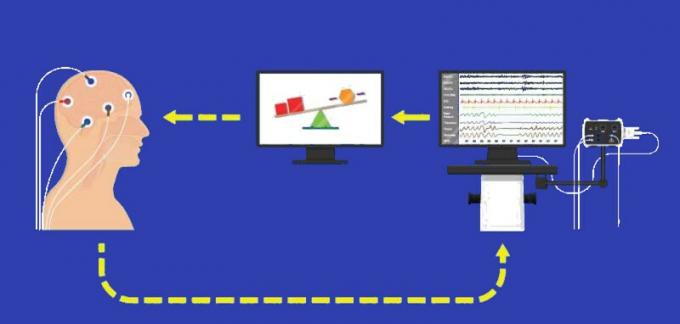The benefits of neurofeedback treatment in cases of anxiety
Advantages and benefits of neurofeedback treatment in cases of anxiety (BC Neuroscenter)
The problems generated by an excess of anxiety are complex phenomena with an important psychological facet: it is in this aspect of anxiety that we find aspects such as intrusive thoughts and obsessions, catastrophic predictions, psychological rumination caused by trying not to think about something, etc.
But beyond this, the fact of being very anxious also has a physiological aspect based on automatic neurobiological processes, which in principle are automatic and unconscious Now, there are therapeutic resources that allow us to question the latter, such as the neurofeedback. Let's see what neurofeedback is about and how it is used in people who suffer from too much anxiety.
- Related article: "Neurofeedback: what is it and how is this therapeutic tool used"
What is neurofeedback?
Neurofeedback is a technique that allows us to monitor the brain activity of a person and make them aware of the processes that take place in their system, with the The objective is to make it easier for you to modify later and through training the psychological processes that may be causing cases of anxiety or stress. excessive.
It is a type of biofeedback, that is to say, of a technology that allows us to collect the data of the activity of the organism in direct, with which we can read in situ which brain impulses are responsible for altered states or relaxed states of consciousness.

In short, neurofeedback is based on making the person aware of what type of electrical impulses generated by the brain are more beneficial and generate pleasurable states, as well as daily training this type of electrical stimuli until they occur automatic.
- You may be interested: "Parts of the Nervous System: functions and anatomical structures"
What uses does neurofeedback have?
The practice of neurofeedback has become popular in recent decades to treat all kinds of psychological disorders in people with ADHD, stress, hyperactivity, insomnia, depression, chronic fatigue or chronic pain.
In recent years, medical science has found more and more uses of neurofeedback that allow us to train the brain to learn certain skills or aptitudes, and its use is becoming more widespread in the field of sport and business.
In addition to that, neurofeedback has been shown to be highly effective in reducing and controlling cases anxiety, as well as to improve cognitive processes such as attention, memory or creativity.
- Related article: "How do neurons work?"
The benefits of neurofeedback treatment in cases of anxiety
Below we present a summary of the most important advantages and benefits offered by neurofeedback treatment in the treatment of anxiety.
1. Trains the regulation of brain waves
Although each person experiences anxiety in a different way, the majority of those affected by this alteration usually present a increased activity of beta brain waves, responsible for generating states of anxiety, stress, excessive activation or agitation.
The study with the technique of neurofeedback allows to determine which waves are activated in excess and which ones are presented in a deficient way, and consequently programs a training plan so that the person learn to activate the positive waves associated with calm and tranquility and separate those that are more negative.
As has been indicated, this training allows to reduce the stress levels in the person and with time allows him to automate all the trained processes in his day to day.
- You may be interested: "Types of brain waves: Delta, Theta, Alpha, Beta and Gamma"
2. Promotes emotional management
Neurofeedback allows us be aware of the unconscious processes that take place in our brain and that allows us to overcome our anxiety problems, as well as any other psychological or emotional alteration.
This technique also helps us to know ourselves better and to be aware at all times how our brain works and what electromagnetic impulses are causing each of our emotions and feelings.
This training helps us learn to manage our feelings and act consciously to act when necessary and change those brain processes that are generating states of anxiety, stress or distress.
- Related article: "Types of Anxiety Disorders and their characteristics"
3. Reduces pharmacological dependence
Being a non-invasive technique, neurofeedback allows us to depend less on the consumption of drugs of all kinds to treat anxiety.
Using neurofeedback with a qualified professional, we will learn to reduce our daily anxiety levels and integrate useful strategies in our day to day to manage our emotions, without using any specific drug for anxiety or any another type.
4. Improves the management of cognitive processes
Neurofeedback has become popular in recent years due to its great advantages when it comes to optimizing a wide variety of cognitive processes that can help us get the most out of our brain.
Some of the cognitive processes that the neurofeedback technique improves are attention, memory, planning and creativity, which is why the practice of this technique is beneficial for almost any job or job in the sector.
5. It enhances sleep quality
The practice of neurofeedback allows us to have a calm brain and achieve states of emotional balance and well-being that allow you to carry out any activity, both daily and at night, in a natural and efficient way, and sleep is one of the most important. Once the anxiety problems have been overcome, the ability to fall asleep is much greater.
Training our brain to correct its functioning allows us to achieve brain activity conducive to falling asleep, in the that those brain waves that help us rest at night and have a restful sleep are activated correctly, avoiding the anxiety.
Are you interested in having the therapeutic support of neurofeedback?
If you want to enjoy the benefits of neurofeedback, get in touch with us; in neurocenter We will be happy to assist you.
